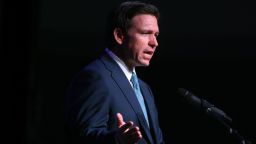Editor’s Note: Jodi Eichler-Levine (@jeichlerlevine) is a professor of religion studies at Lehigh University in Bethlehem, Pennsylvania, and author of “Painted Pomegranates and Needlepoint Rabbis.” She writes a weekly newsletter on religion and popular culture. The views expressed here are her own. Read more opinion on CNN.
A Florida fifth-grade teacher decided to show her students the animated Disney film “Strange World” in class. The kids might have loved it, but at least one parent wasn’t amused.
Now the teacher, Jenna Barbee, is under investigation by the Florida Department of Education for possible violation of the state’s 2022 “Parental Rights in Education.” (Dubbed the “Don’t Say Gay” law by critics, it limits public school lessons about sexual orientation, prohibiting them in some grades and requiring that any mentions conform to state standards.)

Barbee told her story on TikTok after a friend’s tweet about the investigation went viral. She says she selected the film because it reinforced lessons on earth science and ecosystems. But then she said a parent (who is a local school board member), upset by the film’s depiction of a gay teenager flirting with his crush, reported her to the state.
If this seems like a special crossover episode in which Florida Gov. Ron DeSantis’ war on Disney meets his attacks on public education, that’s because they both come from the same hackneyed writers’ room. Though terrifying, American battles over public education are a tale as old as time. These conflicts recur because — according to Walt Disney himself — “Our greatest natural resource is the minds of our children.”
Adults want to set the agenda for those minds. After Disney opposed the Parental Rights in Education law and paused political donations in the state, DeSantis has been trying to take control of Disney World’s special self-governing district. The political maneuvering led Disney to sue DeSantis and the Central Florida Tourism Oversight District board, which has since countersued.
Why would DeSantis, as a Republican who claims to be pro-business, antagonize the largest single-site employer in his state, a company that attracts tens of millions of tourists a year? And why, as a social conservative, would he take aim at the nation’s leading purveyor of wholesome family-friendly American films?
Because the Cinderella Castle holds an entire century’s worth of cultural capital. Disney remains an enduring symbol of youth — and childhood is the symbolic crucible in which we forge our notions of the future and the values it will contain. Disney is a potent cultural force that now promotes a vision of diversity and inclusion that regressive groups are right to fear.
DeSantis’ performative anti-wokeness is catering to this element, a subset of conservative Christians who feel threatened by the company’s immense narrative magic. He duels with the Mouse on their behalf, but he didn’t invent the crusade against a “woke Disney.” They did.
In 1997, the Southern Baptist Convention — the nation’s largest Protestant denomination, then and now — boycotted Disney over both its stories (the coming-out episode of “Ellen” on Disney-owned ABC, for example) and its policies (the inclusion of things like health care for same-sex partners of Disney employees).
“When Disney crosses to the other side of the street, there’s a sense of betrayal and outrage,” the convention’s Richard Land explained at the time. “You can’t walk the family side of the street and the gay side of the street in the Magic Kingdom at the same time.”
Betrayal is a telling word. Though there is no church on Disney World’s Main Street — Walt reportedly didn’t want to favor any single denomination — conservative Christians were well-represented a couple of generations ago.
These lapsed fans recall a Disney steeped in nostalgic portrayals of small-town Midwestern life — one where Jimmie Dodd, a born-again Christian, sang about proverbs on the “Mickey Mouse Club” with an all-White cast. They want Disney’s worlds to stay frozen in the black-and-white amber of an old television’s glow.
In February, DeSantis announced his appointees to the board of the newly formed oversight district, now engaged in the Disney lawsuit. Its members include Ron Peri, who has embraced homophobic conspiracy theories. (He didn’t respond to CNN’s request for comment when it broke the story.) DeSantis declared that all the board members “very much want to see Disney be what Walt envisioned.”
But what did “Uncle Walt” envision? There’s no simple answer. On the one hand, Disney studios were diverse enough to include Black animator Floyd Norman and a host of Jewish creatives during his lifetime (the latter defended him against charges of anti-Semitism). He also had the company’s first animated feature film, 1937’s “Snow White and the Seven Dwarfs,” translated into foreign languages, including Arabic and Hindi.
On the other hand, there’s a reason that Disney of the 1940s and 1950s is associated with White Christianity. Many of those films contain horrific stereotypes of Black people and Native Americans, as the company now acknowledges. Same-sex dancing was banned in Disneyland from 1957 until 1985.
Today’s Disney is undoubtedly different. When “The Little Mermaid” swims back into theaters this month, she will be portrayed by Halle Bailey, a Black actress. This year’s Disney Pride merchandise is already on sale. Disney Junior has featured South Asian and Jewish traditions. Ms. Marvel (owned by Disney) fights evil and Islamophobia in Jersey City.
The company’s tales have begun to reflect American diversity, and these depictions have power because stories have always had power. Christians know this as well as anyone. After all, they have deployed technologies from the printing press to radio to film in order to share “the greatest story ever told.”
Whether people love, hate or ignore Disney, nearly every American has heard of Disney. Because we are our stories, and our stories are us. This is why representation isn’t just something we pursue at the ballot box.
When I tell people I’m (partially) a scholar of religion and Disney, I get a lot of funny looks. But while the Christian Bible is often touted as America’s “best-selling” book, the aggregate cultural power of the Disney-owned brands, which also include “Star Wars,” The Muppets and “The Simpsons,” is the repository of more American hopes and dreams than any single religious tradition. Millions of Americans unite around Disney stories because the breadth of “once upon a time” can be written to welcome everyone.
It can be tempting to dismiss what DeSantis is doing as just another version of the 1997 boycott that ended in 2005 when it turned out that a critical mass of Americans weren’t willing to stop going to Disney World and watching ESPN (also owned by Disney). At the same time, Disney was supporting an adaptation of C.S. Lewis’ “The Lion, the Witch, and the Wardrobe.” (Spoiler alert: The lion is sacrificed and resurrected).
But DeSantis’ attack on Disney is really a new mutation of this backlash.
The first change is that some of the evangelicals who form the GOP base worry they have lost more of the national story — and their “share” of the population — since the 1990s, and are now fervently Christian nationalist.
The second is that, this time, the anti-Disney folks are deploying the power of the state. The Southern Baptist Convention is no joke. But it’s not the government. DeSantis and the legislature wield immediate power that a religious group in America can’t.
Get our free weekly newsletter
Ironically, many in the Southern Baptist Convention have moved on — and even offered discount tickets to Disneyland during their 2022 annual meeting. Though some do echo DeSantis, over one-third of Southern Baptists approve of same-sex marriage equality, and such issues are simply not a top priority for today’s young evangelicals.
Disney World is not the Roman Colosseum. No one is persecuting Christians there (in fact, I heard a celebrity reading the gospels there at Christmastime last year). The Disney tradition — like the American Dream — has simply become more expansive.
DeSantis vs. Disney isn’t just about one governor’s presidential ambitions or one company’s profits (though it is also about those two things). It’s an existential battle over who gets to tell America’s stories and how. Right now, Disney is winning.






